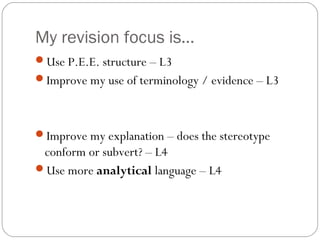
03 editing disability
- 1. My revision focus is… Use P.E.E. structure – L3 Improve my use of terminology / evidence – L3 Improve my explanation – does the stereotype conform or subvert? – L4 Use more analytical language – L4
- 2. What is disability and what different types of disability are there?
- 3. Learning Objective Understand the different stereotypes of disability in TV Drama Write a 2 x P.E.E.s on disability Write 2 x P.E.E.s (one about editing) on disability
- 4. Disability in TV Drama Physically Disabled / Disfigured – often shown as outsiders, unable to do normal things Mentally disabled – Often shown as strange, odd, childlike, outsiders Able Bodies / Minded – often shown as “normal” and “ideal”
- 5. Examples of disabled characters in TV Drama Artie from Glee (in a wheelchair) Izzy from Coronation Street Spencer from Hollyoaks (wheelchair user) (learning disability) Tommy from Coming Down the Lizzie from Mountain (Down’s Syndrome) Emmerdale The entire cast of Cast Offs (variety) (deaf)
- 6. The Representation of Disability Characters with disabilities are often portrayed in TV Dramas as being outsiders, strange, unable to do everyday activities, immature, weaker than “able bodied, able minded” characters, less attractive etc. Traditionally in films, villains were often given a disability or deformity to make them seem scarier or more evil. Although our association of disability with “evil” has since declined, society often still links disability to weakness and makes disabled characters objects to pity.
- 7. In pairs: How would you represent them using the micro elements? Physically disabled: Mentally disabled:
- 8. Coming Down The Mountain BBC TV DRAMA 2 viewings – first one make notes on difference Second viewing make notes on micro-elements Choose at least two micro elements Write detailed notes on both Be prepared to write at least 2 PEEs for each Cinematography Mise-en-scene Sound Editing
- 9. P.E.E. Point – introduce the Micro-element Evidence – give evidence and use LOTS of terminology Explain – does this conform to or subvert the stereotype? These are in the back of your revision guide!
- 10. Write a PEE for your chosen micro elements: SOUND Point: Your area of representation E.g. A stereotypical representation of disability is shown through the diegetic dialogue of Ben’s character. Evidence: Your micro element E.g. Ben comments ‘I like Weetabix’ in response to David’s annoyance about him finishing them. Explain: Linking the two E.g. This simplistic language used by Ben implies that he doesn’t share the complex emotional awareness of his brother. This therefore conforms to the stereotypical view of a mentally disabled person being less intelligent than an able-minded person.
- 11. Candidate responses EXAM CLIP & EXAM RESPONSE
- 12. SWAP answers Is their point accurate? Have they followed the PEE structure? Have they used lots of media terms? Have they linked their answer to the area of representation? Have they written clearly? Give one mark for each – Will you score 5/5???
- 13. Myths of Disability People with A person with a disabilities are disability is sick, or inspirational, brave, has something and courageous for wrong with them. living successfully with their disability. People with disabilities have a People with severe poor quality of disabilities need to live life. in nursing home or rehabilitation hospitals or under constant supervision so that People with disability always need they do not hurt expensive and high-tech assistive themselves. devices or services.
- 15. Timed Conditions on one of the Disability clips Friday - Revise editing terms Intervention – Every Wednesday Download Revision Booklet Download Lit Mat